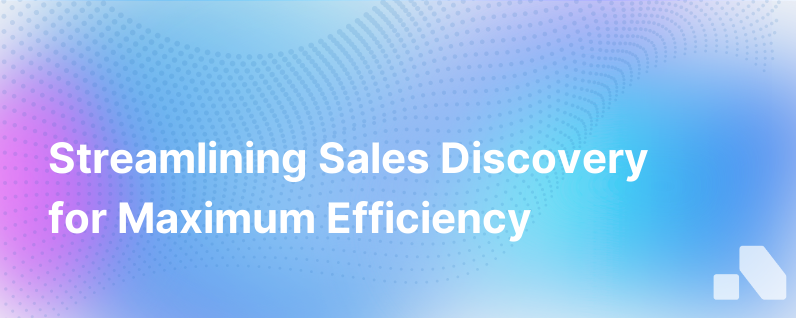
The discovery process is often characterized as an opportunity for sales representatives to gain valuable insights into a prospect’s pain points, priorities, and decision-making processes. However, many sales professionals underappreciate its potential, missing out on crucial information that could propel a deal forward, or perhaps, highlight a misalignment early on, saving valuable time and resources.
Optimizing your sales discovery process isn’t just about asking the right questions; it’s a comprehensive approach that enhances the buyer’s journey, ensures alignment with prospect needs, and sets the stage for presenting an effective solution. A well-orchestrated discovery process anchors successful sales strategies and delivers a competitive advantage in a crowded marketplace.
Here's an exhaustive guide to refining and mastering your sales discovery process:
Understanding the Sales Discovery Process
The sales discovery process serves as the bedrock for relationship-building in the sales cycle. It’s where sales professionals learn about the prospect’s specific challenges, goals, and buying motives. This is a critical juncture—missing the mark here could result in misaligned value propositions and, ultimately, lost deals.
A proper discovery process includes comprehensive research, establishing rapport, asking thoughtful, open-ended questions, actively listening to responses, and confirming your understanding. Analyzing the information garnered during this process is essential to tailor subsequent sales presentations and pitches.
The Framework for an Effective Discovery Call
To optimize discovery calls, a framework that offers structure yet allows for flexibility is essential:
Pre-Call Research: Before the call, gather information about the prospect’s company, industry, competitors, and potential challenges they might be facing. Use tools and platforms that harness artificial intelligence to expedite and enrich your research.
Setting the Agenda: At the beginning of the call, confirm the prospect’s availability, provide an overview of what the call will entail, and confirm their key topics of interest to ensure alignment.
Rapport-Building: A natural conversation eases tensions and fosters a comfortable environment for sharing information. Begin with light, congenial banter before transitioning into more targeted discovery questions.
Probing Questions: Employ the SPIN (Situation, Problem, Implication, Need-Payoff) questioning technique or the similar BANT (Budget, Authority, Needs, Timing) framework to uncover necessary details about the prospect’s current state and aspirations.
Active Listening: Show genuine interest in the responses by listening attentively. Demonstrate your engagement by summarizing their points for clarity and asking follow-up questions.
Value Proposition Tease: Without diving into a full pitch, offer a glimpse of value by relating your solutions to the prospect’s stated needs in a way that piques their interest.
Next Steps: Conclude by summarizing key points, suggesting a clear path forward, and setting expectations for subsequent interactions.
Best Practices for Discovery Calls
Certain methodologies can enhance the efficacy of discovery calls:
Adopt Consultative Selling: Position yourself as a trusted advisor rather than a product pusher. Understand the prospect's world view and tailor your conversation to their context and needs.
Utilize CRM Data: Leverage data from customer relationship management systems to personalize your approach and stay informed on previous interactions with the prospect or their company.
Utilize Sales Enablement Tools: Sales enablement platforms can provide critical insights into a prospect’s recent business activities, which can shape the direction of your discovery questions.
Empathize with the Prospect: Empathy allows you to understand and relate to the prospect's circumstances, fostering a sense of trust and collaboration.
Practice Active Problem-Solving: Use the information garnered to think on your feet and suggest potential ideas for problem-solving, showcasing your strategic thinking.
Document Insights: Record insights from the discovery call in your CRM system to ensure that you and your team can reference and build upon this knowledge throughout the sales cycle.
Continuous Improvement: Post-call, analyze what worked and what didn't. Use this reflection to tweak your approach for future discovery calls.
Pitfalls to Avoid
While refining the discovery process, be aware of potential pitfalls:
Talking More Than Listening: The discovery call is about the prospect, not about your product or service. Resist the urge to over-communicate and instead, concentrate on drawing out the prospect's story.
Overwhelming with Questions: Be strategic in the number and type of questions asked. Balance your inquiry so as not to intimidate or overwhelm the prospect.
Failing to Follow-Up: If you commit to sending additional information or setting up another meeting, ensure you follow through promptly. Reliability is key in building trust.
Being Unprepared: Entering a discovery call without adequate preparation can squander a potential opportunity. Preparation shows respect and professionalism.
Neglecting to Qualify: Ensure you are talking to a decision-maker or influencer who has the authority to drive things forward. Professional time is precious, and yours should not be wasted on a lead that lacks the power to buy-in.
Conclusion
Optimizing your sales discovery process is pivotal in establishing a successful sales strategy. It creates a foundation for building trust, understanding unique challenges, and presenting tailored solutions that resonate with the prospect. The discovery process should be intentional, strategic, and continuously refined to adapt to changing buying behaviors and market conditions. With a nuanced approach to discovery, sales teams can differentiate themselves in a competitive environment, become trusted advisors, and ultimately, close more deals.
In today's digital-first sales environment, combining refined human engagement techniques with powerful AI tools like those offered by Aomni can dramatically increase the efficiency and effectiveness of your sales discovery process. With the right preparation, structure, and tools, your discovery calls can become a significant asset in your sales playbook.